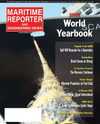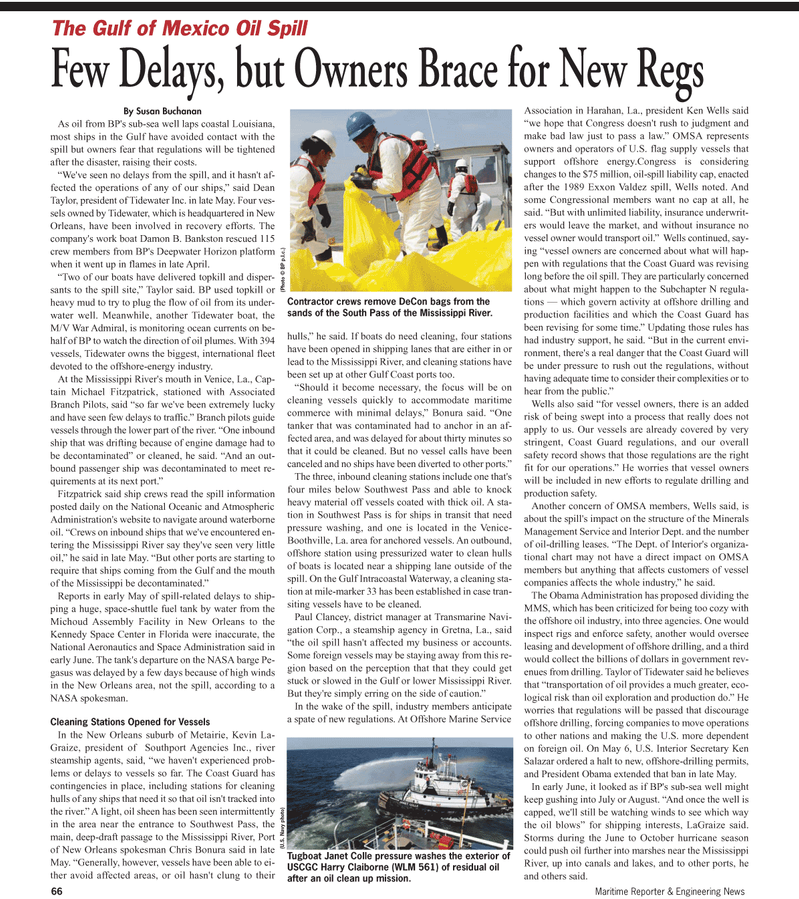
Page 66: of Maritime Reporter Magazine (June 2, 2010)
Read this page in Pdf, Flash or Html5 edition of June 2, 2010 Maritime Reporter Magazine
By Susan Buchanan
As oil from BP's sub-sea well laps coastal Louisiana, most ships in the Gulf have avoided contact with the spill but owners fear that regulations will be tightened after the disaster, raising their costs. “We've seen no delays from the spill, and it hasn't af- fected the operations of any of our ships,” said Dean
Taylor, president of Tidewater Inc. in late May. Four ves- sels owned by Tidewater, which is headquartered in New
Orleans, have been involved in recovery efforts. The company's work boat Damon B. Bankston rescued 115 crew members from BP's Deepwater Horizon platform when it went up in flames in late April. “Two of our boats have delivered topkill and disper- sants to the spill site,” Taylor said. BP used topkill or heavy mud to try to plug the flow of oil from its under- water well. Meanwhile, another Tidewater boat, the
M/V War Admiral, is monitoring ocean currents on be- half of BP to watch the direction of oil plumes. With 394 vessels, Tidewater owns the biggest, international fleet devoted to the offshore-energy industry.
At the Mississippi River's mouth in Venice, La., Cap- tain Michael Fitzpatrick, stationed with Associated
Branch Pilots, said “so far we've been extremely lucky and have seen few delays to traffic.” Branch pilots guide vessels through the lower part of the river. “One inbound ship that was drifting because of engine damage had to be decontaminated” or cleaned, he said. “And an out- bound passenger ship was decontaminated to meet re- quirements at its next port.”
Fitzpatrick said ship crews read the spill information posted daily on the National Oceanic and Atmospheric
Administration's website to navigate around waterborne oil. “Crews on inbound ships that we've encountered en- tering the Mississippi River say they've seen very little oil,” he said in late May. “But other ports are starting to require that ships coming from the Gulf and the mouth of the Mississippi be decontaminated.”
Reports in early May of spill-related delays to ship- ping a huge, space-shuttle fuel tank by water from the
Michoud Assembly Facility in New Orleans to the
Kennedy Space Center in Florida were inaccurate, the
National Aeronautics and Space Administration said in early June. The tank's departure on the NASA barge Pe- gasus was delayed by a few days because of high winds in the New Orleans area, not the spill, according to a
NASA spokesman.
Cleaning Stations Opened for Vessels
In the New Orleans suburb of Metairie, Kevin La-
Graize, president of Southport Agencies Inc., river steamship agents, said, “we haven't experienced prob- lems or delays to vessels so far. The Coast Guard has contingencies in place, including stations for cleaning hulls of any ships that need it so that oil isn't tracked into the river.” A light, oil sheen has been seen intermittently in the area near the entrance to Southwest Pass, the main, deep-draft passage to the Mississippi River, Port of New Orleans spokesman Chris Bonura said in late
May. “Generally, however, vessels have been able to ei- ther avoid affected areas, or oil hasn't clung to their hulls,” he said. If boats do need cleaning, four stations have been opened in shipping lanes that are either in or lead to the Mississippi River, and cleaning stations have been set up at other Gulf Coast ports too. “Should it become necessary, the focus will be on cleaning vessels quickly to accommodate maritime commerce with minimal delays,” Bonura said. “One tanker that was contaminated had to anchor in an af- fected area, and was delayed for about thirty minutes so that it could be cleaned. But no vessel calls have been canceled and no ships have been diverted to other ports.”
The three, inbound cleaning stations include one that's four miles below Southwest Pass and able to knock heavy material off vessels coated with thick oil. A sta- tion in Southwest Pass is for ships in transit that need pressure washing, and one is located in the Venice-
Boothville, La. area for anchored vessels. An outbound, offshore station using pressurized water to clean hulls of boats is located near a shipping lane outside of the spill. On the Gulf Intracoastal Waterway, a cleaning sta- tion at mile-marker 33 has been established in case tran- siting vessels have to be cleaned.
Paul Clancey, district manager at Transmarine Navi- gation Corp., a steamship agency in Gretna, La., said “the oil spill hasn't affected my business or accounts.
Some foreign vessels may be staying away from this re- gion based on the perception that that they could get stuck or slowed in the Gulf or lower Mississippi River.
But they're simply erring on the side of caution.”
In the wake of the spill, industry members anticipate a spate of new regulations. At Offshore Marine Service
Association in Harahan, La., president Ken Wells said “we hope that Congress doesn't rush to judgment and make bad law just to pass a law.” OMSA represents owners and operators of U.S. flag supply vessels that support offshore energy.Congress is considering changes to the $75 million, oil-spill liability cap, enacted after the 1989 Exxon Valdez spill, Wells noted. And some Congressional members want no cap at all, he said. “But with unlimited liability, insurance underwrit- ers would leave the market, and without insurance no vessel owner would transport oil.” Wells continued, say- ing “vessel owners are concerned about what will hap- pen with regulations that the Coast Guard was revising long before the oil spill. They are particularly concerned about what might happen to the Subchapter N regula- tions — which govern activity at offshore drilling and production facilities and which the Coast Guard has been revising for some time.” Updating those rules has had industry support, he said. “But in the current envi- ronment, there's a real danger that the Coast Guard will be under pressure to rush out the regulations, without having adequate time to consider their complexities or to hear from the public.”
Wells also said “for vessel owners, there is an added risk of being swept into a process that really does not apply to us. Our vessels are already covered by very stringent, Coast Guard regulations, and our overall safety record shows that those regulations are the right fit for our operations.” He worries that vessel owners will be included in new efforts to regulate drilling and production safety.
Another concern of OMSA members, Wells said, is about the spill's impact on the structure of the Minerals
Management Service and Interior Dept. and the number of oil-drilling leases. “The Dept. of Interior's organiza- tional chart may not have a direct impact on OMSA members but anything that affects customers of vessel companies affects the whole industry,” he said.
The Obama Administration has proposed dividing the
MMS, which has been criticized for being too cozy with the offshore oil industry, into three agencies. One would inspect rigs and enforce safety, another would oversee leasing and development of offshore drilling, and a third would collect the billions of dollars in government rev- enues from drilling. Taylor of Tidewater said he believes that “transportation of oil provides a much greater, eco- logical risk than oil exploration and production do.” He worries that regulations will be passed that discourage offshore drilling, forcing companies to move operations to other nations and making the U.S. more dependent on foreign oil. On May 6, U.S. Interior Secretary Ken
Salazar ordered a halt to new, offshore-drilling permits, and President Obama extended that ban in late May.
In early June, it looked as if BP's sub-sea well might keep gushing into July or August. “And once the well is capped, we'll still be watching winds to see which way the oil blows” for shipping interests, LaGraize said.
Storms during the June to October hurricane season could push oil further into marshes near the Mississippi
River, up into canals and lakes, and to other ports, he and others said.
The Gulf of Mexico Oil Spill
Few Delays, but Owners Brace for New Regs
Contractor crews remove DeCon bags from the sands of the South Pass of the Mississippi River.
Tugboat Janet Colle pressure washes the exterior of
USCGC Harry Claiborne (WLM 561) of residual oil after an oil clean up mission. (U.S. Navy photo) (Photo © BP p.l.c.) 66 Maritime Reporter & Engineering News

 65
65

 67
67
